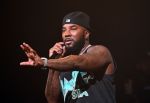Federal mediator George Cohen already has gotten the union to agree to a 7-to-10 day extension on labor talks, but still awaits the owners’ response, a source told ESPN senior NFL analyst Chris Mortensen.
The 24-hour extension on Thursday was offered by the owners and accepted by the union when both sides made their most significant progress in labor talks to date, sources said.
Nevertheless, the two sides still have major differences, which Cohen will revisit independently Friday while also seeking the owners’ agreement to a lengthier extension.
Future Of The League
 In a guest column, NFL rep Greg Aiello outlines the league’s problems with the CBA and ways to fix the system as the game moves forward. Story
In a guest column, NFL rep Greg Aiello outlines the league’s problems with the CBA and ways to fix the system as the game moves forward. Story
With the CBA expiring on March 3, NFLPA executive George Atallah breaks down how the players and the union view the crucial talks. Story
• NFL labor history since 1968
• Sando: 10 things to know
• NFL Labor: Topics page
Indianapolis Colts center Jeff Saturday, a member of the NFL Players Association’s executive committee, told The Associated Press about the extension after the sides met for about eight hours before Cohen. The CBA was set to expire at midnight Thursday, which would likely have prompted the first work stoppage since 1987 for a league that rakes in $9 billion a year.
“We just know right now that we granted a 24-hour extension,” Saturday said as he and Steelers quarterback Charlie Batch left the session.
According to sources familiar with Thursday’s agreement to extend the CBA deadline, there are no face-to-face negotiations scheduled Friday between the owners and NFL Players Association, but Cohen will meet independently with each side to discuss their differences in labor talks.
As it stands, the 24-hour extension, according to sources, gives the union a chance to review the league’s latest proposal and for both sides to decide on the next step — be that another extension, more negotiations, a lockout or decertification.
In addition to the owners’ proposal Thursday, the union has also made concessions in the latest negotiations, sources on both sides told Mortensen. The details of those concessions are unknown.
The deadline extension does not mean any transactions can occur, according to a league source. As part of Thursday’s agreement, even though an extension was granted, the league year has ended. Teams no longer can cut, re-sign players or make any player moves after 11:59 p.m. ET Thursday, until there’s a new CBA.
League spokesman Greg Aiello confirmed the transaction freeze via text, saying teams are free to negotiate with players and agents, but signings are prohibited.
Failing to make a deal could put the two sides on the road to a year without football, even though opening kickoff of the 2011 season is six months away. The labor unrest comes as the NFL is at the height of its popularity, breaking records for TV ratings: This year’s Super Bowl was the most-watched program in U.S. history.
Without a new CBA, the owners could lock out the players, and the union could decertify to try to prevent it through the courts — something the NFLPA did in 1989. It formed again in 1993.
Sources told ESPN the union was prepared to decertify Thursday. Colts quarterback Peyton Manning, Saints quarterback Drew Brees, Patriots quarterback Tom Brady, Patriots guard Logan Mankins, Chiefs linebacker Mike Vrabel, Chargers wide receiver Vincent Jackson, Vikings linebacker Ben Leber, Vikings defensive end Brian Robison and Texas A&M linebacker Von Miller have agreed to be name plaintiffs on the antitrust suit the players will file against the NFL if no labor agreement is reached and the union files for decertification, according to sources.
Commissioner Roger Goodell and the NFL’s negotiating team arrived at a federal mediator’s headquarters about 45 minutes ahead of NFLPA executive director DeMaurice Smith and his group.
“We’re working hard,” Goodell said.
Also on hand for the NFL were Pash, outside counsel Bob Batterman, New York Giants owner John Mara, Green Bay Packers president Mark Murphy, Washington Washington Football Team general manager Bruce Allen and several other league executives. Mara and Murphy are members of the league’s labor committee, which has the authority to call for a lockout if a new agreement isn’t reached.
“We’ll stay at it as long as it takes,” Pash said.
They’ll be staying at least into Friday, though a deal isn’t done. Washington Washington Football Team player rep Vonnie Holliday told the AP that the two sides are “still apart” on a pact to replace the current CBA.
“I don’t see how we can be that close right now unless somebody is going to pull a rabbit out of the hat; I just don’t see it,” he said.
Since the 1987 players’ strike that shortened the season to 15 games — with three of those games featuring nonunion replacement players — there has been labor peace in the NFL. The foundation of the current CBA was reached in 1993 by then commissioner Paul Tagliabue and union chief Gene Upshaw.
It has been extended five times as revenues soared, the league expanded to 32 profitable teams, and new stadiums were built across America to house them.
The contract extension reached in 2006 was the final major act for Tagliabue, who then retired, succeeded by Goodell. An opt-out clause for each side was included in that deal, and the owners exercised it in May 2008 — three months before Upshaw died.
Smith replaced Upshaw in March 2009.
Joining Smith at the mediation session Thursday were union president Kevin Mawae, New Orleans Saints quarterback Drew Brees, Saturday, and about a dozen others, including current and former players.
The biggest sticking point all along has been how to divide the league’s revenues, including what cut team owners should get up front to help cover certain costs, such as stadium construction. Under the old deal, owners received about $1 billion off the top. They entered these negotiations seeking to add another $1 billion to that.
Among the other significant topics: a rookie wage scale; the owners’ push to expand the regular season from 16 games to 18 while reducing the preseason by two games; and benefits for retired players.













